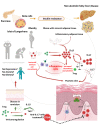Depression and Obesity in Patients With Psoriasis and Psoriatic Arthritis: Is IL-17-Mediated Immune Dysregulation the Connecting Link?
- PMID: 34367160
- PMCID: PMC8334867
- DOI: 10.3389/fimmu.2021.699848
Depression and Obesity in Patients With Psoriasis and Psoriatic Arthritis: Is IL-17-Mediated Immune Dysregulation the Connecting Link?
Abstract
Patients with psoriasis are frequently obese and experience anxiety or suffer from depressive disorders. The immunopathogenesis of psoriasis and indeed psoriatic arthritis is largely based on the pivotal role of IL-17/IL-23 axis, to an extent that currently monoclonal antibodies selectively inhibiting IL-17 or IL-23 are routinely used for the treatment of psoriatic diseases. Emerging data, demonstrating a decisive role for IL-17 and IL-17 producing cell subsets, such as Th17 in the induction and progression of obesity and depression has led authors to suggest that psoriatic disease, obesity and anxiety/depression may indeed be interconnected manifestation of a state of immunedysregulation, the linked being IL-17 and its related cells. We discuss this hypothetical link in depth taking into account the beneficial effects anti-IL17 and anti-IL-17 receptor inhibitors in treating psoriatic disease and the on-going debate as to whether these biologics may exert a direct or indirect effect in ameliorating concomitant obesity and depressive disorders, which are frequently noted in the same patient.
Keywords: IL-17; IL-23; depression; immunity; obesity; psoriasis; psoriatic disease.
Copyright © 2021 Zafiriou, Daponte, Siokas, Tsigalou, Dardiotis and Bogdanos.
Conflict of interest statement
EZ: Lilly, Genesis Pharma, Janssen, LEO Pharma, Novartis, UCB, Pfizer, Sanofi Genzyme, AbbVie—speaker honoraria/or paid investigator. ED: Allergan, Novartis, Genesis, ELPEN, Bayer, Teva, Merck-Serono, Genzyme-Sanofi, Roche, UCB: speaker or chairman horonaria, advisory or travel grants, and clinical research-educational support grants. DB: AbbVie, Novartis, Genesis, ELPEN, Pfizer, Aenorasis, Menarini, Kopper, ITF Hellas, Roche, MSD, GSK, Hospital Line-speaker or chairman horonaria or paid investigator or clinical research and educational support grants. The remaining authors declare that the research was conducted in the absence of any commercial or financial relationships that could be construed as a potential conflict of interest.
Figures


Similar articles
-
Role of IL-17 in psoriasis and psoriatic arthritis.Clin Rev Allergy Immunol. 2013 Apr;44(2):183-93. doi: 10.1007/s12016-012-8307-1. Clin Rev Allergy Immunol. 2013. PMID: 22362575 Review.
-
The new era for the treatment of psoriasis and psoriatic arthritis: perspectives and validated strategies.Autoimmun Rev. 2014 Jan;13(1):64-9. doi: 10.1016/j.autrev.2013.08.006. Epub 2013 Sep 8. Autoimmun Rev. 2014. PMID: 24021172 Review.
-
Depression, a major comorbidity of psoriatic disease, is caused by metabolic inflammation.J Eur Acad Dermatol Venereol. 2023 Sep;37(9):1731-1738. doi: 10.1111/jdv.19192. Epub 2023 Jun 2. J Eur Acad Dermatol Venereol. 2023. PMID: 37184282 Review.
-
Use of brodalumab for the treatment of psoriasis and psoriatic arthritis.Immunotherapy. 2015;7(4):323-33. doi: 10.2217/imt.14.113. Immunotherapy. 2015. PMID: 25917624 Review.
-
Psoriasis and the TNF/IL23/IL17 axis.G Ital Dermatol Venereol. 2019 Aug;154(4):418-424. doi: 10.23736/S0392-0488.18.06202-8. Epub 2019 Jan 15. G Ital Dermatol Venereol. 2019. PMID: 30648836 Review.
Cited by
-
Bimekizumab for the Treatment of Plaque Psoriasis with Involvement of Genitalia: A 16-Week Multicenter Real-World Experience - IL PSO (Italian Landscape Psoriasis).Dermatol Pract Concept. 2024 Apr 1;14(2):e2024052. doi: 10.5826/dpc.1402a52. Dermatol Pract Concept. 2024. PMID: 38416060 Free PMC article.
-
Interleukin-17-targeted treatment in patients with spondyloarthritis and associated cardiometabolic risk profile.Front Immunol. 2023 Jul 18;14:1203372. doi: 10.3389/fimmu.2023.1203372. eCollection 2023. Front Immunol. 2023. PMID: 37533855 Free PMC article. Review.
-
The Role of IL-17 Cytokines in Psoriasis.Immunotargets Ther. 2021 Nov 24;10:409-418. doi: 10.2147/ITT.S240891. eCollection 2021. Immunotargets Ther. 2021. PMID: 34853779 Free PMC article. Review.
-
IL-23 past, present, and future: a roadmap to advancing IL-23 science and therapy.Front Immunol. 2024 Apr 15;15:1331217. doi: 10.3389/fimmu.2024.1331217. eCollection 2024. Front Immunol. 2024. PMID: 38686385 Free PMC article. Review.
-
Exploring the impact of ketogenic diet on multiple sclerosis: obesity, anxiety, depression, and the glutamate system.Front Nutr. 2023 Aug 25;10:1227431. doi: 10.3389/fnut.2023.1227431. eCollection 2023. Front Nutr. 2023. PMID: 37693246 Free PMC article. Review.
References
Publication types
MeSH terms
Substances
LinkOut - more resources
Full Text Sources
Medical

